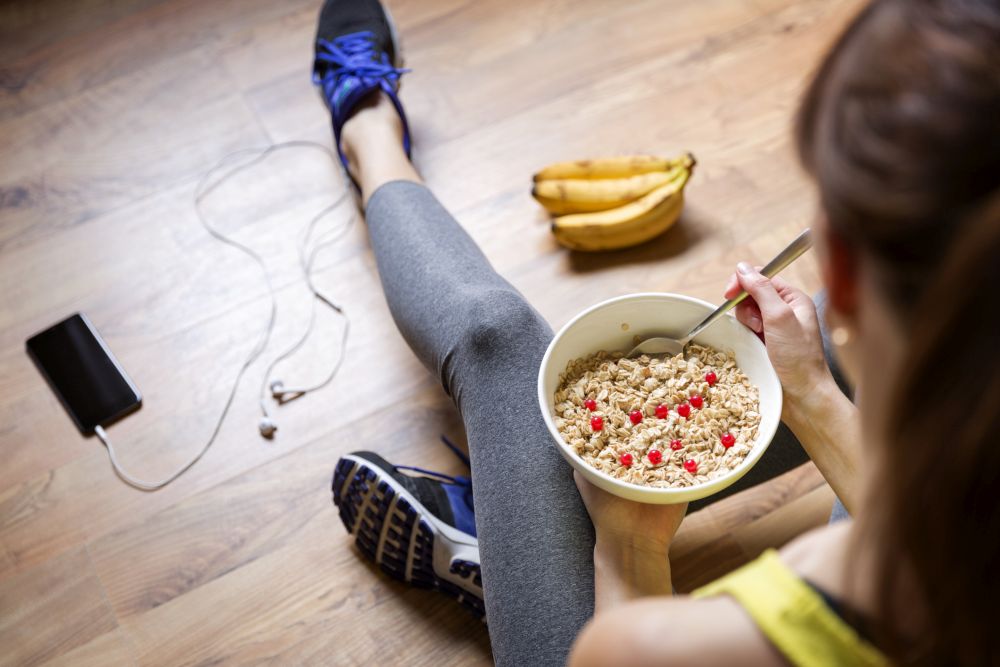The 10 commandments of good nutrition for runners
Follow these 10 rules to fuel your training and stay healthy

Nutrition for runners can often get over-complicated, and it’s easy to get bogged down in pages and pages of nitty-gritty details. While this level of scrutiny may be important for elite runners who are looking for even the smallest edge over their competitors, for the rest of us, it’s simply not necessary. If you want your nutrition to support your training, follow these 10 guidelines to help you run at your best.

Snack frequently
Snacking frequently throughout the day will keep your blood sugar levels from dropping too much and causing you to feel tired and sluggish on your runs. It’ll also help you consume enough calories to support your training, which some runners have a hard time doing through meals alone.
Of course, the quality of your snacks is important if you want them to benefit your training. Ideally, your snacks should contain a good mixture of carbohydrates and protein, like a banana and peanut butter, some trail mix with dried fruits and nuts, yogurt and berries or even some plain popcorn are great options for runners. Or, if you need something super-convenient, check out our list of best store-bought snacks for runners.
Don’t hold the carbs
Say it with us: carbs are your friend. While there is some research out there that supports carb-cycling as a good nutrition strategy for runners, the majority of studies have come to the conclusion that for most runners, skimping on carbs at any point in your training cycle provides little, if any, benefit. Try to include high-carbohydrate foods in all of your meals like rice, potatoes and sweet potatoes, pasta, bread, oatmeal and high-protein carbs like beans and lentils.
Drink water

Dehydration can decrease your performance, even in cool weather. Most runners can stay adequately hydrated by drinking water with each of their meals, but you should keep an eye on your hydration status to know if you’re drinking too much or too little. Ideally, you want your pee to be pale yellow in colour, which indicates that you’re properly hydrated. If your urine is very dark, you’re probably dehydrated, and if it’s basically clear, you can probably afford to cut back. Keep in mind that some medications or supplements can also affect the colour of your urine.
Time your nutrition
It’s important that you time your nutrition around your runs and workouts. Eat too much (or eat the wrong thing) before a run and you could be left with cramps and other mid-run tummy troubles, but eat too little and your stomach will be growling at you halfway through your run.
Try to have a meal three to four hours before a run or workout that contains a good mixture of carbohydrates, protein and fat. If you’re eating closer to go-time than that, you should reduce the amount of protein and fat in your pre-run snack because those nutrients are harder to digest. If you’re eating within an hour of running, stick to something high-carbohydrate but low in fat, fibre and protein, like a banana, a piece of toast with jam or a small smoothie.
Eat for recovery

Your post-run nutrition is key to kick-starting the recovery process so you can be ready to go again the next day. Ideally, you should be eating something that has a 4:1 ratio of carbohydrates to protein within 30 minutes of your run (chocolate milk is a classic example of a runner’s recovery drink). If you find you’re not hungry for a full meal immediately after running, have a small snack instead and then give your stomach some time to settle before sitting down to something more substantial.
Remember, fuelling for performance doesn’t only happen immediately after your runs. Eating well throughout the entire day will ensure your body can recover properly and you can continue to train hard without burnout or injuries.
Only supplement if necessary
Supplements can be helpful for certain runners, but they should never take the place of good, whole-food nutrition. Before you consider adding a supplement to your diet, evaluate your day-to-day eating habits to see if there are any gaps and address those before doing anything else.
There are some runners who may benefit from or require a supplement. Runners who follow a vegan diet may need to supplement with vitamin B12, and some runners may need an iron supplement if their levels are too low. There is also plenty of evidence that runners in northern climates can benefit from a vitamin D supplement, but it’s a good idea to get some bloodwork done first to figure out how low your levels are so you know how much you should be taking.
Make room for treats

It’s easy for runners to become obsessive about their nutrition, so don’t forget to relax and live a little from time to time. You don’t have to be perfect, and it’s perfectly OK to have pizza and beer for dinner sometimes or to have your favourite candy bar when the mood strikes. Perfection is unnecessary and can take the joy out of eating. Remember, happy runners are fast runners, so don’t forget to let your hair down once in a while.
Mind your alcohol consumption
A cold beer after a long run is one of the simple pleasures in life and can even provide some benefits post-run, but it’s very easy to have too much of a good thing. Beer (or any other alcoholic beverage) should never replace water or food after a run. Binge-drinking can also negatively affect your sleep, which slows down recovery, so if you’re going to drink, do so in moderation and make sure it’s not detracting from your regular good nutrition habits.
Watch out for fibre overload
Be careful not to go overboard on fibre intake when you’re trying to satisfy your carbohydrate needs with foods like brown rice, oatmeal and whole-grain bread and pasta. While fibre is absolutely necessary for runners, too much of it can leave you with an upset stomach or send you running for the porta-potty on your next long run. Avoid eating high-fibre foods right before a run and when you’re carb-loading before your goal race.
Sleep

You may have heard the expression “sleep is a nutrient,” and if you haven’t, write it on a sticky note and stick it to your bathroom mirror. Your body cannot recover properly without adequate sleep, and without it, you’ll miss out on major performance gains, no matter how hard you train. Lack of proper sleep also puts you at a greater risk for injuries, so aim to get seven to nine hours of quality sleep every night — your body will thank you.


